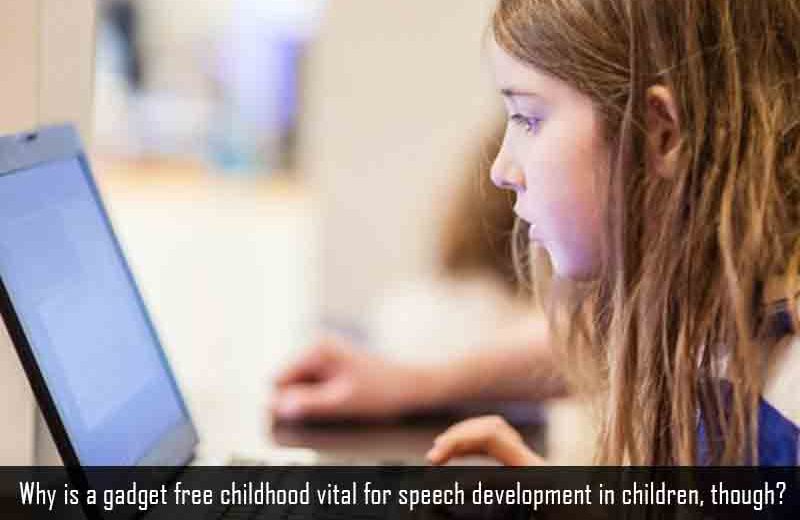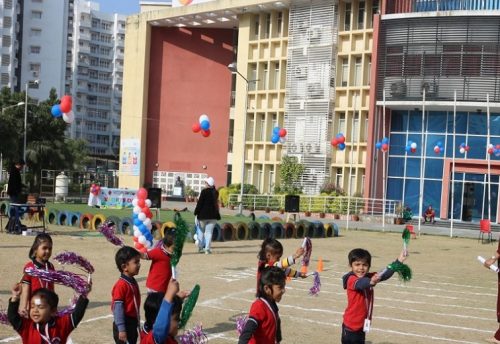
Why a Gadget free childhood is vital for speech development
Why a Gadget free childhood is vital for speech development
In this article, you will learn about why a gadget free childhood is vital for speech development. The first 3 years of life, when the brain is developing and maturing, is the most intensive period for acquiring speech and language skills. These skills develop best in a world that is rich with sounds, sights, and consistent exposure to the speech and language of others.
There appear to be critical periods for speech and language development in infants and young children when the brain is best able to absorb language. If these critical periods are allowed to pass without exposure to language, it will be more difficult to learn. Parents are always concerned about their child’s nutrition intake. But many are not aware about the “language nutrition” that the child requires in order to develop their speech and language skills.
Nowadays children spend most of their time in front of screens. Parents also find it easy to manage their children when they are given a screen to watch for. But the impact it may have on the child’s language development will be very bad. It may lead to receptive (understanding) and expressive (speaking) language delay, attention deficits, hyperactivity, sleep problems, etc.
Why is a gadget free childhood vital for speech development in children, though?
The first few years of a child’s life are the most critical period for the child’s language development. So, the child should be provided with adequate “language nutrition” during that period. Many will be wondering what is ‘language nutrition’. It’s nothing but talking, playing, reading books, singing, etc. with your child. Always use simple short sentences while talking to your toddlers. You can also use simple gestures along with words to help them understand better.
The screen time will replace all these parent-child interaction which are critical for social, emotional, speech and language development. This can later affect their academics too. A child with a language delay might pronounce words well but only be able to put two words together. A child with a speech delay might use words and phrases to express ideas but be difficult to understand.
Speech delay, also known as alalia, these two problems often overlaps. Many researchers have studied this and also concluded many theories about it. By using s screening tool, researchers studied that the more time children spend on smart phones, tablets and electronic games and other handheld devices the more likely the child have delays in expressive speech.
Children will learn to talk and communicate through interactions with others. This is the way how they will learn to communicate well if they r not communicating they are not learning. Every one minute that your child is spending on the screen is one minute fewer that he could speak or learn with others. Screen time is the time you child is spending on screen whether it’s TV or any other gadget. Screen time takes away the time of child which he can spend by talking and communicating with other people.
This can be well understood by an example if you are travelling in a car with you children. Your children have a screen in front of him as he is watching his favourite TV show or playing any game. So you will not interrupt him by talking or asking something, on the other side, if he don’t have any gadget in front of him he would probably be talking and communicating with you. Using a screening tool, researchers found that the more handheld screen time a child’s parent reported, the more likely the child was to have delays in expressive speech, concluding that for each 30-minute increase in screen time, a child was 49 per cent more likely to be at risk of expressive speech delay. A study found that the more time children between the ages of six months and two years spent using handheld screens such as smart phones, tablets and electronic games, the more likely they were to experience speech delays.
Here are a few simple yet powerful strategies to help children develop and reinforce “speech” through the early years.
• Start talking to your child at birth. Even newborns benefit from hearing parents talk.
• Respond to the bay’s coos and babbling.
• Play simple games like peek-a-boo and patty-cake.
• Talk to your child, a lot. Tell them what you are doing about anything and everything as you do it.
• Read age appropriate books aloud. If your baby loses interest in the text, just talk about the pictures.
• Plan family trips and outings. Your new experiences give you something interesting to talk about before, during, and after the outing.
• Look at family photos and talk about them.
• Ask your child lots of questions.
• Don’t criticize mistakes. Instead, just model correct sentence formation.
• Have your child interact with kids whose language is a little better than theirs.
Looking for Play School In Delhi





Leave a Reply